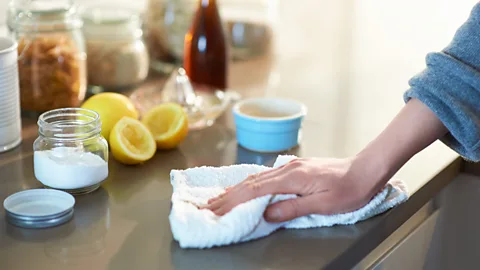Is cleaning with baking soda better for the environment?
 Getty Images
Getty ImagesCleaning with baking soda is a longtime hack associated as much with old housewives as TikTok videos. But does it really work – and is it really greener way to clean?
I don't like cleaning. I also don't like buying commercial cleaning products: I worry that they are harmful both to me and to the environment. As a result, you'll sometimes find me mopping our entire kitchen floor with just kitchen roll dampened in tap water.
So when my BBC editor asked me to test a cupboard staple – baking soda – in my household chores, I agreed to give it a go. I would try a few hacks popularised online and see if they worked for me. Could they help keep my home clean, while alleviating my environmental concerns and save me money at the same time?
Keeping your home fresh by using cupboard staples like baking soda (also known as bicarbonate of soda, bicarb, sodium bicarbonate or NaHCO3, if you're feeling chemical, but not baking powder, which is a combination of baking soda and cream of tartar) is a perennial hack, associated as much with old housewives as with TikTok videos, health sites and even the Great British Bakeoff's Nancy Birtwhistle. The idea is that in certain situations, baking soda can replace shop-bought cleaning products, sparing not only the environment but also ourselves from harm.
I head to the grocery store and buy two small store-brand jars of the stuff for £0.59 ($0.77) a piece, along with a small jar of a branded version for £1.59 ($2.08). Then I call Nathan Kilah, a senior lecturer in chemistry at the University of Tasmania, Australia.
"Any cleaning property that we're going to get from baking soda arises from the chemical properties it has," he tells me. "[When we clean] there are different parts in the grime and muck that can be chemically modified by the baking soda."
Baking soda or bicarbonate of soda is a base or alkali, he explains, meaning it has a high pH. Therefore, one of its chemical properties is that it is able to remove hydrogen in the form of an ion from other materials.
"So the molecules literally react">window._taboola = window._taboola || []; _taboola.push({ mode: 'alternating-thumbnails-a', container: 'taboola-below-article', placement: 'Below Article', target_type: 'mix' });
